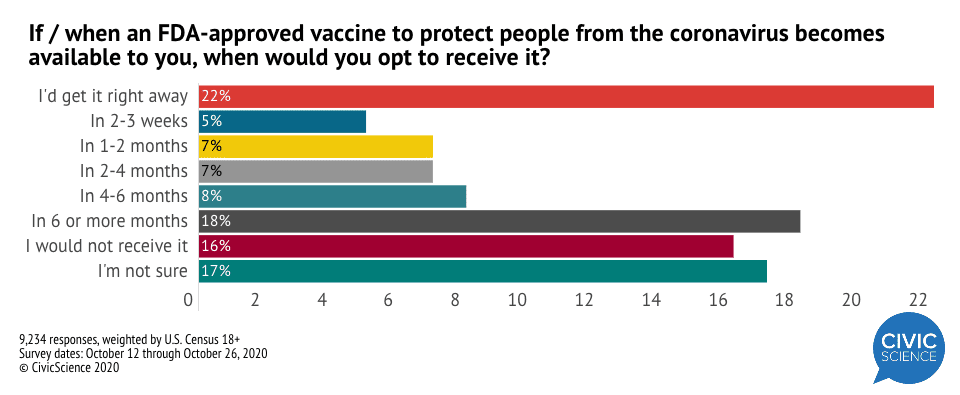With the stark reality of coronavirus cases rising again across the country, a vaccine couldn’t come sooner. But for vaccines to protect the populous, people have to not only feel comfortable with them, but decide to then receive them once they are on the market.
It’s no secret to anyone that vaccine hesitancy is on the rise. Be it safety concerns or fears of political persuasion, CivicScience data has shown a steady decline in the percentage of U.S. adults who say they’re ‘very’ comfortable with vaccines overall.
In fact, the monthly percentage of those highly comfortable with vaccinations at large fell more than twenty percentage points since the start of 2020 (69% in January compared to October’s 47%).
More of the moment, when it comes to if and when an FDA-approved coronavirus vaccine is available to Americans, only 22% percent of those surveyed say they would get the vaccine right away.
What may be most notable about this is nearly just as many (18%) say they would wait six or more months, and another 17% just aren’t sure about it as of the October survey. Despite surging COVID cases, it’s clear that hesitancy to receive a future vaccine that will very well lessen the potency of the virus is running rampant across the country.
This uncertainty is clear when cross-tabulating the vaccination survey with current concern about the spread of the coronavirus. Just because people would wait months or more doesn’t mean they are not concerned about what’s happening. What highlights this the most is those who say they’d wait the longest are more likely to report being much more or somewhat more concerned about the pandemic in recent weeks. One thing doesn’t necessarily equal another.
Another factor you’d assume would drive vaccine opt-in is knowing someone who has had the virus. Interestingly enough, those who say they would not get the vaccine at all are the most likely not to know someone who was diagnosed with COVID-19.
But perhaps more interesting (and what makes you scratch your head) is those who say they’d get it right away and those who aren’t sure about it are just as likely, respectively, to know someone who had COVID. This further sheds light on just how difficult it is for many to trust a future vaccine right now.
Somewhat surprisingly, those who are between age 18 and 34 and those 55+ are all just as likely to say they’d get the vaccine right away (Americans 35-54 are slightly less likely than the general population to be gung-ho from the get go). Older Americans are less likely to say they wouldn’t receive it or that they aren’t sure as of yet, but they are the most likely to say they’d wait six or more months to be pricked.
All that aside, things look hopeful for the current flu season.
While hesitancy to get vaccinations is generally increasing, people are at least latching onto protecting themselves from the flu this winter. As of October data, 38% of Americans say they have already gotten their flu shot. This is up from 9% in September.
But the most compelling chart comes when comparing October 2020 flu shot intent to 2019’s. Last year, only 24% of those surveyed said they had already gotten theirs in October, a difference of 14 percentage points compared to this year. It seems Americans are taking the flu shot even more seriously this season with many more already protected.
Age is a driving factor in this 2020 flu shot growth. Comparing last October to the current month, those aged 55 and older are more likely to have sprung for their flu shot (by 20 percentage points) but we also observe a growth of nearly 10 percentage points among the younger age subsets, too.
Seemingly, you’d think that flu shot adoption and COVID concern correlated nicely. And they certainly do, but that’s not the entire story. While those who have already gotten or plan to get a flu shot this year are more likely to have reported being much more or somewhat more concerned about the pandemic in recent weeks, there is a strong subset of the population who aren’t sure about flu shots or don’t plan to get one who are still reporting high levels of COVID concern.
The murkiness is even more evident when comparing flu shot intent with coronavirus vaccine intent. While, sure, those who have gotten a flu shot this year are more likely than the general population to say they’d get a coronavirus vaccine as soon as they are able to, the rest of them are varied in when they would get a future COVID vaccine. You could say though that, overall, the data is somewhat encouraging for vaccine advocates. Those who already get vaccines for the flu are more likely to be comfortable with a potential COVID vaccine, so some confidence is there already.
All in all, vaccinations are having a bit of a PR problem. Depending on the election outcome, clinical trials, and timeline, sentiment could evolve in a matter of days, if not hours.









